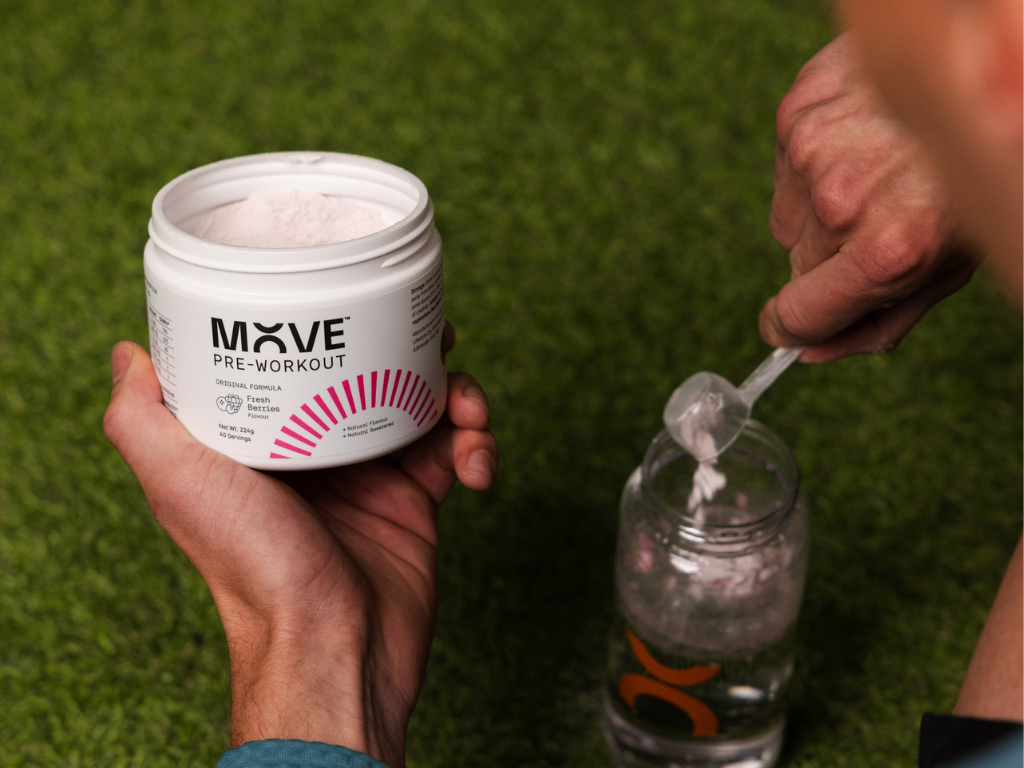Your Complete Guide to
Pre-Workout Supplements
The world of pre-workout supplements can be confusing
General Pre-Workout Questions
What exactly is a "pre-workout" supplement?
A pre-workout is a multi-ingredient dietary supplement, typically in powder form, designed to be consumed before an exercise session. It's formulated to enhance energy, focus, and endurance, but the specific combination of ingredients can vary widely.
What is the main purpose of taking a pre-workout?
The main purpose is to acutely improve athletic performance. By providing a boost of energy and focus, it can help users push past plateaus, perform more reps, and increase the intensity of their workouts.
Are pre-workouts just for bodybuilding and lifting weights?
No. While popular in bodybuilding, pre-workouts can benefit a wide range of activities, including cardio, HIIT, cycling, running, and team sports. The energy and endurance benefits are applicable to any activity that requires a physical and mental boost.
What is the difference between a pre-workout and an energy drink?
An energy drink primarily provides a quick energy spike from high doses of caffeine and sugar. A pre-workout is specifically formulated with performance-enhancing ingredients like amino acids, nitric oxide boosters, and other compounds to improve muscular performance and blood flow, in addition to providing energy.
What is a "clean-label" pre-workout?
A clean-label pre-workout is one that avoids artificial sweeteners, colors, and fillers. It prioritizes transparent ingredient lists, using natural flavorings and clinically-dosed, pure ingredients.
Can a pre-workout help me with weight loss?
Yes, indirectly. Many pre-workouts contain caffeine and other thermogenic ingredients that can slightly boost your metabolism. More importantly, by increasing energy and endurance, they can help you train harder and longer, leading to greater calorie expenditure.
Is there a difference between men's and women's pre-workouts?
Not typically. The core ingredients in pre-workouts (caffeine, beta-alanine, creatine, etc.) affect men and women in the same way. The main difference is often in the branding, marketing, and caffeine content, as women generally have a lower body weight and may require a lower dose.
What's the difference between a "stim" and "non-stim" pre-workout?
A "stim" (stimulant) pre-workout contains caffeine and other stimulants for an energy boost. A "non-stim" (non-stimulant) pre-workout is caffeine-free and focuses on ingredients that enhance blood flow, focus, and muscle pumps without the jittery side effects.
Are pre-workouts suitable for beginners?
Yes, but it's crucial to start with a half dose to assess your tolerance to stimulants. Beginners should also prioritize products with transparent labels and moderate caffeine content (under 200mg per serving).
What does "clinically dosed" mean?
A "clinically dosed" supplement contains ingredients in the same amounts that were shown to be effective in scientific human trials. This ensures you're getting a powerful and effective dose, not just a token amount for marketing.
Do pre-workouts expire?
Yes, all supplements have a best-by date. While they may not be harmful after this date, the ingredients can degrade, losing their potency and effectiveness. It's best to consume them before the expiration date for maximum results.
Why do some pre-workouts taste better than others?
Taste often depends on the type of sweeteners and flavorings used. Some products use artificial sweeteners like sucralose or acesulfame potassium, while others use natural sweeteners like stevia or monk fruit. These can significantly impact the flavor profile.
What is a "pump" pre-workout?
A "pump" pre-workout is formulated with ingredients that increase nitric oxide production, which leads to vasodilation (the widening of blood vessels). This increases blood flow to the muscles, giving the user a feeling of being "pumped."
How do pre-workouts affect my mood and focus?
Many pre-workouts include ingredients like caffeine, L-Tyrosine, or Huperzine A, which are known to improve cognitive function, focus, and reduce the perception of mental fatigue. This helps you get "in the zone" for a focused workout.
What is the difference between a pre-workout and a protein shake?
A pre-workout is designed for energy and performance before a workout, while a protein shake is primarily for muscle repair and recovery after a workout. They serve different purposes and are often used together in a well-rounded fitness regimen.
Are all pre-workout supplements safe?
Not all pre-workouts are created equal. Some may contain unregulated ingredients, and their safety can be questionable. It is crucial to choose products that are third-party tested and have transparent labels.
What's the best workout drink?
For most workouts under 60 minutes, plain water is the best workout drink. For longer or more intense sessions, a sports drink or an electrolyte blend can help replenish minerals and glucose lost through sweat.
What does a pre-workout drink do to your body?
Pre-workout drinks provide a synergistic effect of their ingredients. Caffeine stimulates the central nervous system, L-Citrulline promotes blood flow, and beta-alanine buffers acidity in the muscles, all working together to improve physical and mental performance.
Can pre-workout be used for activities other than lifting weights?
Absolutely. Pre-workout can be beneficial for activities like running, swimming, or cycling, as the ingredients can help improve cardiovascular endurance and reduce the feeling of fatigue.
What is the difference between a pre-workout and a fat burner?
A pre-workout is designed to enhance athletic performance, while a fat burner is specifically formulated with thermogenic compounds to increase metabolism and promote fat loss. Some pre-workouts have fat-burning ingredients, but it's not their primary purpose.
What is a pre-workout supplement?
A pre-workout is a multi-ingredient dietary supplement, typically in powder form, designed to be consumed before an exercise session. It is formulated to enhance energy, focus, strength, and endurance during a workout. The specific ingredients can vary widely between products, but common components include caffeine, amino acids, and creatine.
What do pre-workouts do? / What is pre-workout for?
Pre-workouts work by stimulating the central nervous system and supporting metabolic processes. Their primary function is to:
- Increase Energy and Fight Fatigue: Ingredients like caffeine block adenosine, a neurotransmitter that makes you feel tired.
- Improve Focus and Alertness: Caffeine is a well-studied ergogenic aid that can improve concentration and mental alertness.
- Enhance Endurance and Power: Ingredients like creatine and beta-alanine help muscles produce energy more efficiently and can buffer against fatigue, allowing you to train harder for longer.
- Increase Blood Flow: Some ingredients (like L-Citrulline) can help widen blood vessels, which improves nutrient and oxygen delivery to working muscles.
What are the benefits of pre-workout supplements?
The scientifically-backed benefits of pre-workouts are directly related to their functions and include:
- Improved athletic performance during high-intensity exercise.
- Enhanced muscle endurance and power output.
- Reduced perception of fatigue, allowing for longer and more effective workouts.
- Potential for increased lean body mass when combined with a consistent training program.
What is the best pre-workout?
The "best" pre-workout is subjective and depends on individual goals, tolerance, and desired effects. A high-quality pre-workout typically has a transparent label that lists all ingredients and their dosages, is free of proprietary blends, and has been third-party tested for purity and safety. Look for products with clinically effective doses of key ingredients like caffeine (150–300mg), L-Citrulline (6–8g), and creatine (3–5g).
PICK YOUR FUEL








